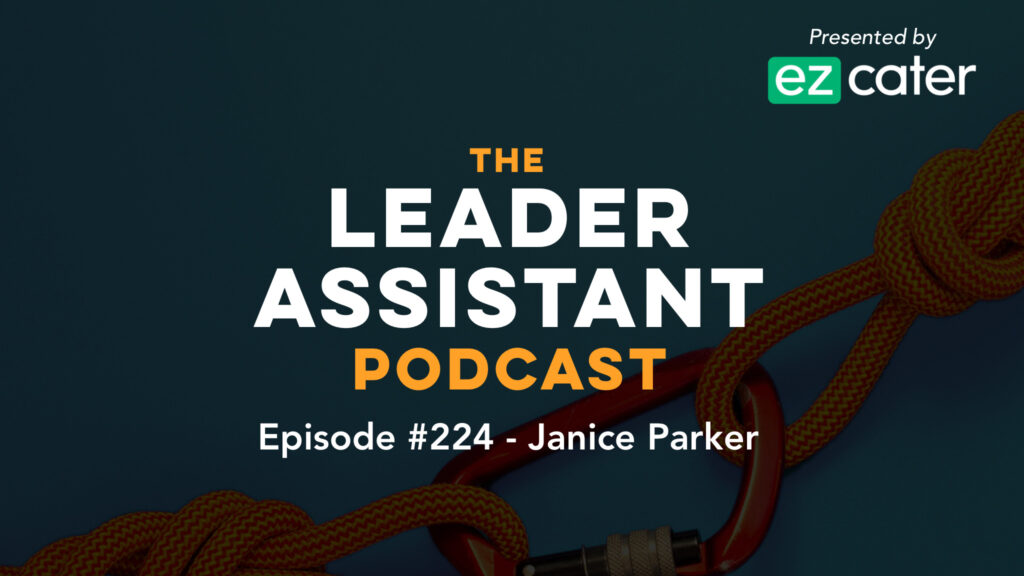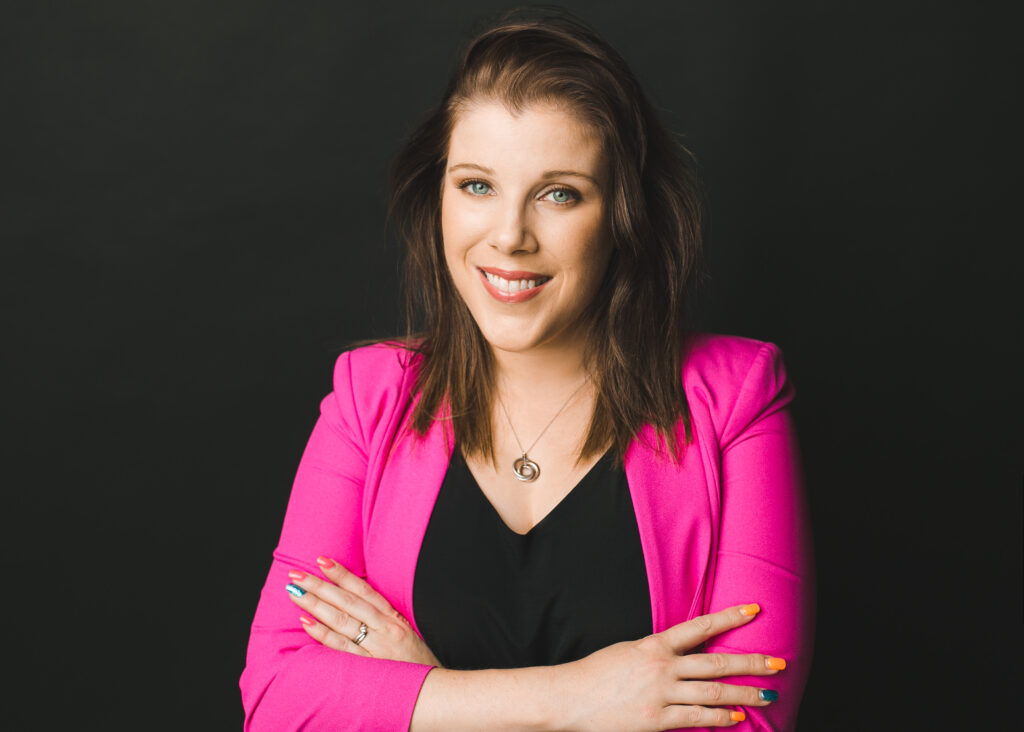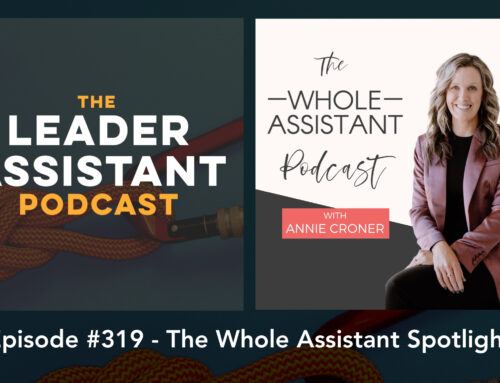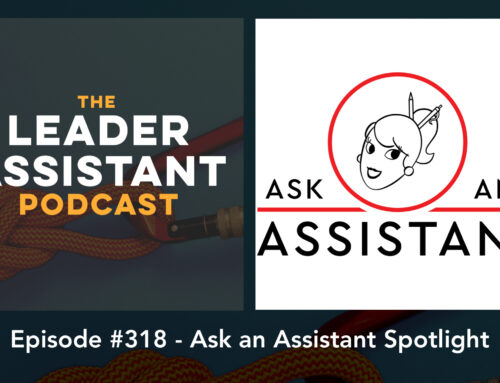Janice Parker is a career executive assistant who is passionate about helping mission-focused founders and CEOs maximize their productivity and efficiency as they scale their companies.
In this episode of The Leader Assistant Podcast, Janice talks about working with founders, remote work as an assistant, aspiring to be a chief of staff, and working in the cryptocurrency industry.
LEADERSHIP QUOTE
If you don’t like something, change it. If you can’t change it, change your attitude.
– Maya Angelou
CONNECT WITH JANICE
ABOUT JANICE
Janice Parker joined global cryptocurrency company, Luno, in 2019 as Executive Assistant to the Co-founder and CEO, Marcus Swanepoel, who is now the Executive Chairman. During her time working with Marcus, Janice relocated back to Melbourne at the end of 2020 after almost 7 years living in London and now supports him in a fully remote role.
Janice is a career Executive Assistant who is passionate about helping mission-focused Founders and CEOs reach their potential as leaders, and maximize their productivity and efficiency as they scale their companies. In addition to 14 plus years’ of experience as an Executive Assistant, she has developed a diverse worldview working in Melbourne and London along with regularly traveling throughout Europe, Africa, Asia, North and Central America.
Janice is very passionate about and aims to be an ambassador for the administrative profession through speaking at events, contributing to industry publications and championing the role inside each organization she has been a part of throughout her career.
–––
THE LEADER ASSISTANT PODCAST IS PRESENTED BY EZCATER
ezCater is the nation’s most trusted provider of corporate food solutions — the best way for companies to order food for daily employee lunches, meetings, and events of any size or budget. ezCater’s simple-to-use platform provides a network of over 100,000 restaurants nationwide, business-grade reliability, food spend management tools, and 24/7 support from their highly trained customer service team.
To explore corporate food solutions or place a catering order, visit ezcater.com.
–––
THE LEADER ASSISTANT PREMIUM MEMBERSHIP
To learn more about how you can join growth-minded Leader Assistants, check out our Leader Assistant Premium Membership for ongoing training, coaching, and community.
THE LEADER ASSISTANT BOOK
Download the first 3 chapters of The Leader Assistant: Four Pillars of Game-Changing Assistant for FREE here or buy it on Amazon and listen to the audiobook on Audible. Also, check out the companion study guide, The Leader Assistant Workbook, to dig deeper.
LEADER ASSISTANT LIVE EVENTS
Check out our constantly updated schedule of events for admins and assistants at LeaderAssistantLive.com.
JOIN THE FREE COMMUNITY
Join the Leader Assistant Global Community for bonus content, job opportunities, and to network with other assistants who are committed to becoming leaders!
SUBSCRIBE
Subscribe to The Leader Assistant Podcast so you don’t miss new episodes!
You can find the show on Apple Podcasts, Spotify, Google Podcasts, Pandora, and Stitcher.
Join my email list here if you want to get an email when a new episode goes live.
LEAVE A REVIEW
If you’re enjoying the podcast, please take 2 minutes to rate and review the show on Apple Podcasts here. Each review helps me stay motivated to keep the show going!
—
EPISODE TRANSCRIPT
Janice Parker 0:00
Hi, I’m Janice Parker and today’s leadership quote comes from Maya Angelou. If you don’t like something, change it if you can’t change it change your attitude
Podcast Intro 0:15
The Leader Assistant Podcast exists to encourage and challenge assistants to become confident game changing leader assistants.
Jeremy Burrows 0:29
With so much on your plate, wouldn’t it be nice if ordering food for the office were easy and reliable. My friends at ezCater our workplace catering pros helping you find food for everything from daily employee meals to staff meetings and special events. With ezCaterer’s network of over 100,000 restaurants nationwide, you’ll have a huge variety of options near you for any group size, dietary need or budget. Your food arrives on time as ordered all supported 24/7 by ezCater’s team of experts visit ezcater.com/leaderassistant to find out more. Hey friends, welcome to The Leader Assistant Podcast. It’s episode 224. And this is your host Jeremy Burrows. I’m excited to be speaking with Janice Parker today. Janice is at a global cryptocurrency company called Luno. And she’s the executive assistant to the co founder and CEO/executive chairman. And we’re gonna learn a little bit about that as well. But I just wanted to welcome Janice to the show. And I’m very excited to be speaking with you today.
Janice Parker 1:39
Thank you for having me excited to be on probably one of the best podcasts I know for EAS.
Jeremy Burrows 1:44
Oh, thank you. Thank you for the kind words. So what part of the world are you in?
Janice Parker 1:50
I’m in Melbourne, Australia. And it is just before 12pm In the afternoon, the day after where you are? Yeah.
Jeremy Burrows 1:59
I always say it’s fun to talk to someone from the future. So
Janice Parker 2:03
yes, certainly certainly in the future is looking bright.
Jeremy Burrows 2:07
Nice. Nice. So tell us a little bit about yourself personally. Do you have cats, dogs, kids, hobbies, all the above?
Janice Parker 2:17
Yeah, of course. So I live with my husband in Melbourne, Australia as well. But we did spend almost seven years living in London. And we actually moved back in the middle of the pandemic at the end of 2020. Not due to COVID. But that was a big, it was probably one of the reasons that we decided to move home. You know, London change, like during the lock downs and we were very far away from family and friends. So being settled back here now for two and a half years. And we now have a five month old golden retriever called Murphy who is taking up a lot of my time training him and give be quite cheeky at times, but has kind of filled a hole we didn’t realize was there. So yeah, we love him being back in our home city.
Jeremy Burrows 2:57
Nice. Nice. And then do you what’s one of your favorite hobbies?
Janice Parker 3:04
Oh, favorite hobbies. I mean, I don’t know if you can call being a foodie or a hobby. I love going out to new restaurants and bars and cafes. And I’m always you know, dragging my husband along to somewhere that’s like on my bucket list that I have probably a bit more of a relaxed hobbies I love to read. Can’t say I’ve read too many books. Since the pandemic, I found my attention span decreased like a lot of people. But I do read lots of blogs and articles. And I’m slowly trying to get back into it now and I just find it. It calms me down and takes me to another world.
Jeremy Burrows 3:37
Awesome. Awesome. Well, let’s let’s jump right in then. So you work at a cryptocurrency company. And the company is actually global. But you are working fully remote that correct?
Janice Parker 3:55
I am Yes. So I started the role when I was in London and move back with the role to Melbourne didn’t actually think it was possible. It was still early days of EAs working remotely. And I think many of us didn’t even think it was a possibility. But when I was actually handing in my resignation to the founder, he sort of looked at me he smiled and he’s like, no, no, no, you’re not resigning. Like, let’s try and make this work. You’re moving back to Melbourne and yeah, it’s been two and a half years can’t say it’s always been easy with the time zones. That yeah, it’s it’s been a wild ride at times. But we are headquartered in London. We were founded in South Africa. And we are all over the world now.
Jeremy Burrows 4:33
Wow. So we’ll we’ll get into remote work, for sure as a good chunk of this conversation. But what’s let’s talk about a couple things first, first of all, crypto, what’s, what’s kind of your elevator pitch or, you know, when you’re at a happy hour and you’re talking with people, they say what industry do you work in? Yes. They say what the heck cuz crypto what’s cryptocurrency? Or I’ve heard a little bit about Bitcoin or whatever, but what what’s your kind of? Yeah, pitch on on that
Janice Parker 5:10
cryptocurrency there’s many forms of cryptocurrency, the main one you would have heard about is Bitcoin. That’s the original one. And I think that was around 2009 2010, that that was created, I may have the year wrong. And it’s meant to be a form, we call like a form of digital gold. So obviously, it’s not something that you can hold, but it’s something that’s meant to hold value over the long term. Another way to describe the industry is it’s meant to be a disruptive to financial services. So you had like these Neo banks come along, and these, you know, money transfer companies, but financial services, by and large, it’s still the same industry, it has been for 1000s of years. And there’s lots of middleman there’s a lot of corruption, there’s a lot of fees, and a lot of people in emerging parts of the world that can’t get into the banking system, or they struggle with inflation. And like I said, high fees. And cryptocurrency is meant to disrupt that space. And it’d be like an equalizer. It’s meant to be decentralized, where you don’t have to go via a middle person or middle bank, you can it’s peer to peer. So it’s meant to make things a bit more fair and equal. Now, in reality, what are we still a long way off from that, but there’s many use cases of it, you know, through South South America and Africa and Asia where, you know, people are sort of able to kind of better their lives through using cryptocurrency.
Jeremy Burrows 6:28
So what what’s kind of your, you know, 30 second summary of what specifically is Luno? Or does Luno do in that industry?
Janice Parker 6:39
Yes, so, we are a global platform. So you can buy and sell some of the major cryptocurrencies with us you got Bitcoin and Aetherium. And USD, see, that may mean something to some of your listeners who may not, you know, you can, you know, we have an exchange as well. So similar to like, you know, how you can trade stocks and shares, you can do that with cryptocurrency. But a lot of people through our platform, they actually they buy their crypto and they hold it almost like long term investments that I have crypto and I hold on to it, because I do see it as a long term investment. Anyone who thinks they’re going to make a quick buck from crypto, and I think that ship sailed about eight or nine years ago now. So it’s just it’s like another form of long term investing.
Jeremy Burrows 7:22
Interesting. And what’s kind of the maybe a funny story or an interesting remark that someone has said to you when they find out that you’re in the cryptocurrency industry, like, is there anybody that like, Oh, you’re one of those people, you know what I’m saying?
Janice Parker 7:40
Yeah. Well, I have regular conversations with my boxing, personal trainer up sort of, you know, Grizzly old man kind of he asked to be sort of in his 50s 60s. Hopefully, Steve is not listening, and it will just be his age. But he’s someone who, you know, pretty much pays with cash doesn’t know anything kind of about like crypto. And he’s always asking me if it’s, you know, they’re scammers Money, money laundering, criminals, and people think that, but if you actually dig a little deeper, there’s a lot more criminal activity with cash and it can’t be traced. Whereas with every cryptocurrency transaction, it can be traced on the underlying technology, which is called the blockchain. So yes, every new industry, every new technology is going to have those who, you know, want to do bad things with it and take advantage of it. But it’s, it’s actually much better for the future. We’ve tracing transactions and you know, if I’ve transfer transfer you money, Jeremy, it’s a lot easier to trace and what would be a normal money transfer? So yeah, it’s interesting. I was having this conversation, the people think it’s a scam. And that’s it is until the industry matures. Right, right.
Jeremy Burrows 8:46
Yeah, definitely.
Janice Parker 8:48
Yeah, I just want to say I always say it’s like the early days of the Internet, think about 9596 Maybe 97. Everyone’s like, what’s this internet thing? And oh, it’s a scam and all it’s never gonna take off. That’s what everyone’s saying about cryptocurrency now. But let’s, let’s circle back to this conversation in five to 10 years time. Yeah, it’d be very different.
Jeremy Burrows 9:07
Cool. Yeah. It’s, it’s definitely a crazy world to be in. And I’m guessing. I haven’t. I’ve personally not worked in the crypto world, but I’m very familiar with it and have followed it pretty closely. And done a little bit of investing myself. But it to me, it seems like you mentioned even the internet craze and all that. It seems like it would be a pretty fast paced, innovative, maybe even volatile, industry. 200% Yeah, I feel that every day.
Janice Parker 9:42
It really is. And I mean, probably for a lot of your listeners, they would have heard more about cryptocurrency in the last sort of 10 to 12 months, and they have in the last sort of 10 or so years. And you know, there was a big exchange in the US that was found to be fraudulent and they collapsed. And because the industry is so interconnected, and One of the big companies are interconnected. And that just sort of how the industry has been built up, it has a knock on effect a domino effect. So when one falls, it can affect all kinds of people in the ecosystem around them. You know, we’re backed by one of the biggest companies in the industry, digital currency group. And, you know, we’re, we’re pretty solid, and you know, we’re stable. But you know, there’s, we have competitors that have fallen down, and people have been made redundant across the industry. And, you know, and things are regulators are changing all the time and governments and that affects how we operate. So yeah, it’s, you know, you can have your To Do lists, you the projects you want to implement, and you want to just throw that up in the air, and I’ll come down a different order.
Jeremy Burrows 10:40
Well, let’s jump into working remotely, then. So you’ve been working remote? What’s maybe your top tips for those who are also working remote or maybe want to do more remote work and want to figure out how to maybe even convince their executives to let them work from home?
Janice Parker 11:01
Yeah, of course, well, I mean, like, sort of top tips, and I’m sure everyone’s heard this before. But like, having boundaries is so important. And it really has helped me with like that work life balance, you know, especially because I do work across such an extreme timezone. You know, like, sort of when it’s 9am, in London, where the founder is, you know, it’s, you know, 6pm, for me, you know, I’ve already had like, a full day, and, you know, it’s, it’s worth discussing those boundaries with them. And sometimes that can be scary, but you have to remember that, you know, they’re human, too. And, you know, execs do have their own personal life outside of work, you know, they got families, friends, hobbies, and I think kind of us all working remotely during the pandemic has kind of, you know, brought it to the forefront that, you know, we are humans outside of work. So to have that conversation, and then, you know, make sure you have those set hours, even if you’re not working across an extreme time zone like I am. And I’m sure you find this the same Jeremy that you know, you’re you can start in the morning, you can get the sort of two 3pm, you might not have had breakfast or lunch, and then kind of your workday can bleed into your evening, your time with your family, especially when you’re just walking out of I’m in a I have my own office at home, and I several people aren’t as lucky, if people are sitting at their kitchen table, you know, you really have to do that kind of close your laptop, have that physical thing walk away or go around, you know, walk around the block, you need to have that, that thing that signals to you that your workday is over. Another top tip for working remotely. And this is not so much about how EAS can kind of ask for it to happen, it’s more what I find helpful, I think we do we’ll get fatigued with connecting over video. But for me, it’s essential we my company operates did this video meetings by default, you know, it’s not a replacement for being in person together. But I find it does help me to maintain the partnership while working remotely. You know, obviously, I would like to be there in person with the founder, but you know, when we are on video, I can see his expressions and see his body language, we can have a laugh together. You know, that’s obviously when technology is working. And I just helps us maintain that partnership that we did build in person, and that we can continue remotely until we spend time you know, in person again.
Jeremy Burrows 13:09
That’s great. So what is there a time when being remote or maybe you can share a story, or to have a situation where not being in person made it really, really hard or, or was not a good setup in that in that time or in that day.
Janice Parker 13:29
I’m probably not to like many like actual, concrete examples I can think of, there’s definitely been times when we’ve had like important meetings. And you know, obviously, you know, you know that we’re the wider team and I’m the person that kind of has to cop it, you know what I’m dialing in at 230 in the morning, which is not fun for my work life balance. But you know, there is given take like, and then I have the flexibility to kind of, you know, take the next morning or afternoon or have a longer weekend or whatever it is, I think sometimes what can be challenging, you know, when you are working remotely is miscommunication. Which is why I mentioned before about it’s you know, Central, I think to connect have a video, but just make sure you are connecting in a regular way. And that really depends on how your exec likes to communicate. You know, maybe they like having phone calls, maybe they want to do video calls, maybe they want to talk on WhatsApp, or slack or whatever it is. So I obviously have my own personal communication style. But I adjust to Marcus who I support and make sure that we’re connecting where he feels comfortable. And it might just be that we’re chatting on WhatsApp, or we’re sending voice notes or emails or whatever it is. But we just need to make sure that we’ve got that kind of that that regular meeting cadence that we are connecting, because so many times and we’ve had, you know, issues with each other. And then we’ve spoken about we’ve realized that that tone of voice that is in ruder communication can be misconstrued and that just having a quick conversation kind of face to face, if you will, over video can solve so many misunderstandings.
Jeremy Burrows 15:01
Yeah, it’s amazing how much nonverbal communication we do and having our videos on is a good way to catch that when you’re in a different country or times, or whatever. Yeah. Cool. Well, I assume you enjoy working from home working remotely.
Janice Parker 15:23
I do. I mean, I do miss having colleagues and going into the office. And I’m very lucky that I got to travel back to London a few times last year, and also to the US to spend time with Marcus and the team. And with the EAA team we have at luno. But just, you know, I spent most of my career I spent, you know, 12 1314 years, you know, Monday to Friday, nine to five in the office. And when the pandemic hit, I’m sure many people listening will feel the same. It was like, wow, we can actually do our job at home, I had a random day here, and they’re working from home, but to actually do it full time and are so much more productive. And then once I kind of got into a routine, made sure that you know, I set up those boundaries. And this was while still working remotely, in London, same timezone. As Marcus, I was like, This is amazing, I can I actually got into exercise, and it’s a really good habit that I kept ever since that I do exercise, you know, sometimes it might be twice a week, but more it’s four or five times a week. And I was never able to be consistent with kind of looking after my own like health and well being before being able to work from home, like getting rid of that commute. And my commute, before I moved to London in London was always quite long and tiring. And not having that now is just gives you so much more on your day to spend time with your family do household errands, you know, just work on hobbies. And now I live right next to the city centre in Melbourne. So even when I do you know one day, go into a role where I’m back in the office, the commute is not going I could just walk to the office. So yes,
Jeremy Burrows 16:59
yes. Yeah. Well, I’d really like to ask you something about your LinkedIn profile, if that’s okay. Yeah. which I’ll link in the in the show notes at leader assistant.com/two to four for those that want to reach out and say hi. But in your in your profiles, kind of sub header, if you will, it says aspiring chief of staff. So tell us a little bit about maybe a couple questions here. One is why are you aspiring to be a chief of staff? What’s what’s interesting to you about that role? And then maybe maybe what you feel is the biggest difference between chief of staff and executive assistant?
Janice Parker 17:45
Yes, I’ll say we’re gonna try and answer both questions together. And I’ll start with saying that I have very strong views about the chief of staff role. So I do find a lot of the time you know that there is a ceiling, that executive assistant hit in our career where you can go no further, perhaps in your company, or even in your career. So it looks like and this has been picking up speed and sort of the last five or so years that the next step is that we step into a chief of staff role. But so many times I’ve seen EAS have become chief of staff, and they’re effectively doing what a CEO would do. And then I see senior EAS, who were doing what a chief of staff does, but they don’t have that title. And, you know, there’s some amazing people who transitioned into the chief of staff role that, you know, there’s an HIE and there’s Hallie Warner. And there’s, you know, there’s a few here in Australia in the UK that I know of, but it is a very different way of working, you know, we tend to work more in the immediate as executive assistant, and there are some of us, you know, I’ve definitely worked on long term strategic projects and, and planning and OKRs. And that sort of thing that my company that chief of staff would do, but you know, sometimes at another company, you got to chief of staff doing that sort of thing. And, yeah, it is a very different way of working chief of staff tend to be working, you know, yes, most times shadowing the co founder. But a lot of times they are working for the business, whereas us as executive assistants, we are working for that executive, also for the wider business. But it’s a very different way. It’s a very different mindset. You know, we can be in the short term as EAS, but it’s more long term thinking as a chief of staff. So I was very much a VPN for years. I was like, No, I don’t want to be a chief of staff. I think I say my career becoming like a business manager, or moving into project management. But I’ve done sort of a lot of like deep thinking over the last 12 months about where my career is going. And I think I’m at a point where I love being an executive assistant. But I would also love to drop a lot of the I call it the core parts of the role bread and butter. I’d love to get rid of the calendar management and the emails and the travel and the expenses in that and concentrate on more of a strategic planning project work that I’ve been kind of involved with the last couple of years. And that’s where I was like, Well, I’ve great role I mean, to utilize those skills that I’m developing and to grow, my experience is to move into a chief of staff role. So I am hoping to move into that role kind of in the next couple of years. I do want to be more experienced before I jump headfirst into into that role. And, yeah, it’s quite exciting. I do feel like now I can see longevity in my career. Whereas when I was thinking, I’ll be an EA for the rest of my career. And there’s nothing wrong with that. But I was like, I’m not sure whether, you know, I really don’t for sort of 15 years do I want to do it for another 1520 more. So this is a way that I can still retain elements that I love, but also removed parts where it’s like, I’ve been doing this for 15 years been there, done that it’s time for a new challenge.
Jeremy Burrows 20:43
Nice. Well, thanks for thanks for sharing. And that’s definitely, definitely a great goal and something to aspire to for sure. So awesome. Yeah, you work with a founder, slash CEO? And what do you have any tips or thoughts on working with founders because I know I work with a founder. I’ve worked with CEO slash founders for I guess, like the last 12 years straight, I think, and I love it. It’s it’s definitely brings its own challenges. But I like being kind of working for the top of the top, if you will. Yes. Same. What’s the Yeah, what’s, what are some thoughts on your experience working with with a founder, and any challenges or pros and cons to that?
Janice Parker 21:42
Yeah, of course. So I mean, similar to you, you know, it’s sort of been five and a half years, and I’ve been working with my second founder, the first one was with a global remittance company, world remit. And that founder was the most amazing person. I mean, my current founders, most amazing people, and I’m sure the same with your founders, I think you have to be a certain kind of person and entrepreneur to take an idea and start a company and then grow it into a larger company, and the things I go through with, you know, their capital fundraisers and you know, dealing with, you know, VCs and, you know, competitors, and then trying to hire people and build culture. And, you know, I think that it’s quite exciting. It’s quite challenging. And I think you have to be a certain kind of person to put yourself through that, and all the stress and sleepless nights, and I’m sure they’re working 20 hour days, I know, certainly, Marcus was doing that in the early days of luno, I joined when they were 200 people. So hey, we’re not quite a startup, then. I absolutely love that, like, Yes, I love kind of working for the top person. But I find you know, I haven’t actually, I’ll caveat this, that I haven’t actually worked for a corporate CEO, just with two founder CEOs right now. And I don’t, I don’t know if I would ever want to move away from this, you know, especially when I’m moving to a chief of staff, I really want to help a founder, like, really scale their company and build it from the ground up. And like the fact that when you are with me, founders, a lot of times, they find me, they’re more hands on. And you know, they’re more involved in the day to day operations of the company, which Jeremy as you would know, sometimes that can be a negative, because they get a little bit too involved in certain things. And they should leave it to their leadership teams that they hire to run those areas. But then, you know, for example, watching the way Marcus works, and just seeing the way his brain ticks and learning from him, like I’ve learned more about business, working with him in the last four years than I think I ever would have learned if I you know, done MBA or something. And, you know, just saying, like, he’ll just he’ll keep tweaking something with the product, and he’ll go to the product team and go, This is not right, this is not right. This is not right. And then I’ll keep working on they’re like, Ah, this is annoying, but then they finally see what his vision is. And they’re like, no, no, this is actually what the product should look like for the customer. Because he’s just so passionate about and he knows, like he started this company to try and solve an issue for our customers. So he wants to make sure we’re putting the best thing out there. It can be challenging, because they’re, they’re put in blood, sweat, tears, their money, their time, their effort. But I find sometimes I don’t switch off. And a lot of times, it’s up to the closest people in their life, you know, maybe their partners, but also their assistants and their chief of staff to obviously take some of that load off their shoulders, and to help them with that. But also to try and get them to put their own boundaries in place. You know, there’s so often that, you know, over the years with Marcus, I’m like, Are you going to take your leave, you know, you don’t need to be at the office this late, you know, make sure you spend some time with your wife. You know, don’t worry about those emails. I can handle it like they I think because they built everything from the ground up from day one. And then as the company grows, they still think that they have to be involved so much. And it’s up to us to kind of guide them and say no, you have talented people to help you run the company. Now you don’t need to kind of shoulder that burden by yourself.
Jeremy Burrows 25:00
Right. Yeah, that’s everything you said is spot on to my experience. And I appreciate you articulating it that clearly, and it’s definitely a different kind of experience, maybe supporting a CEO who is not the founder, or supporting VPs and other roles. So it definitely requires a different skill set. And really, temperament, I guess, if you will. And so it does,
Janice Parker 25:35
yeah, and it requires passion. You know, I’m, I’m so passionate about what we do at our company. And the same when I was at my previous one. You know, obviously, the founders are always going to be much more passionate than we are. But I think, because I hate using the word, but I think it is a much a much more of an intimate working relationship with the founder CEO, then I imagine it would be with a corporate CEO. Because a lot of the times I’ve taken on a lot of helping a lot of elements of his personal life to help them concentrate on the business being his business, that, you know, I know so much more about him and what’s going on. And, you know, and you are working quite closely together, you know, when you’re building a company, you know, helping them to build a company. And I think if you just want to come to work and do a job, and there’s nothing wrong with that, you’re probably not going to last long term, it’s not sustainable to be in a role like this. But if you see this as a career, and you know, there’s there’s room for both to see, you know, a role as a job or a career, then I think it’s going to help you sort of stay there for the long term and be able to weather the lows while you’re waiting for the highest because there is a lot of up and down when you are working in the startup world. And, you know, wondering if your runway is going to last a year and you know, will your investors keep putting in money? And, you know, if the market takes a downturn, how is your company going to handle that? And it’s not for everyone, like it’s not always stable? Definitely, it’s not stable in crypto. So you have to be willing to kind of go along for the ride.
Jeremy Burrows 27:05
Yeah, well said. And you know, everything you said, it’s like, there’s just, there’s just such a different level of risk, you know, and different level of risk reward even in this type of environment, and it’s, yeah, it’s, it’s funny, because it’s so similar in that our day to day tasks and the stuff that we’re responsible for, does transfer to other roles and other organizations where you don’t support a founder. But it almost feels like to me, in my experience, that the stakes are higher when you’re supporting the founder in some ways, because like you said, it’s like, Oh, are we going to run out of cash? Are we going to? Are we going to survive through the holidays this year? And then you get through the holidays? You’re like, Alright, are we gonna survive next year? You know, and it’s just, yeah, it’s it’s definitely exhilarating and exhausting. It can be at times.
Janice Parker 28:08
Yeah, it certainly helps to see whether you’ve got a strong heart to write out all the big crazy shocks that can come up, you know, when you’re working for a startup?
Jeremy Burrows 28:19
Yeah, definitely. Well, GNS, thank you so much, again, for being on the show. Is there? Is there any kind of final thoughts or anything you want to share with assistants of the world listening as we wrap up?
Janice Parker 28:33
Yeah, of course, I do actually mention this quite a bit when I talk to other EAS and want to spoken at conferences, and that and I do like to give my one piece of advice to other assistants. And I always say, What is the worst they can say? If the answer is no, that is not the worst thing that can happen. You know, I’ve, I’m, you know, I learned this early in my career, and it served me very well, you know, asking for a raise, you know, for a promotion, requesting to join a project and I have received nose, but I’ve also received more yeses, and yes, it’s scary. But you know, a lot of times what we’re doing it’s not, you know, it’s not brain surgery. It’s not rocket science. And you know, for every No, you get there will be a yes, one day and it will open up doors and provide opportunities.
Jeremy Burrows 29:21
Well said, great way to wrap it up. Is there anywhere that people can reach out to you and say hi, or other than LinkedIn? Or is LinkedIn the best?
Janice Parker 29:30
Yeah, it’s mainly LinkedIn. You know, and you know, I’m on there often, I’m happy to have a chat. And if any wants to meet DM, ask for advice. Also, always happy to jump on a call. I love networking with other assistants around the world.
Jeremy Burrows 29:45
Love it. Well, I’ll put your LinkedIn URL in the show notes. Leaderassistant.com/224 leaderassistant.com/224. Janice, thanks so much again for your day to be on the show and I wish To the best of luck
Janice Parker 30:02
thank you it’s been really enjoyable
Unknown Speaker 30:16
podcast
Unknown Speaker 30:23
goburrows.com









